The first month with a newborn is a whirlwind—new experiences, sleepless nights, and more diaper changes than you ever imagined. Amidst all the chaos, one of the most important (and beautiful) parts of this time is bonding with your baby. It’s more than just loving them—it’s about creating a sense of security that supports their emotional and cognitive growth. This connection forms naturally, but there are ways to nurture and deepen it.
- Embrace Skin-to-Skin Contact
Skin-to-skin, also called “kangaroo care,” is one of the simplest, most powerful ways to bond.
- How to do it:
- Find a quiet, warm space.
- Undress your baby down to their diaper.
- Place them tummy-down on your bare chest.
- Drape a blanket over both of you for warmth.
Personal note: That moment when you feel their breath on your skin, hear their tiny sounds, and feel them clutch your finger—it’s something hard to put into words. Just incredibly grounding.
- Why it matters: It helps stabilize their heart rate, temperature, and breathing. It boosts breastfeeding success and floods both of you with oxytocin—the bonding hormone.
- Make Eye Contact and Talk to Your Baby
Your baby may not be chatting just yet, but they are watching, listening, and learning.
- Engage their eyes:
- Hold them close—about 8–12 inches from your face.
- Look gently into their eyes.
- Smile. Even if they don’t always focus, they’re picking up on your expressions.
- Talk, sing, and read:
- Narrate your actions: “We’re changing your diaper now,” or “Time for some warm milk.”
- Sing lullabies or even your favorite tunes.
- Read anything out loud. A favorite novel, a parenting book—it’s the rhythm and tone that matter.
Why it helps: Your voice is familiar and comforting from their time in the womb. It reassures them and lays early groundwork for communication.
- Respond to Their Cues
Bonding grows stronger when babies feel heard—even without words.
- Watch for signals:
- Crying could mean hunger, discomfort, or the need to be held.
- Wiggling or fussing might mean they’re overstimulated.
- Rooting or sucking gestures are hunger signs.
- Coos or gazes often signal contentment or a wish to interact.
- Respond consistently:
- Feed them when they’re hungry.
- Change them when they’re wet.
- Hold them when they need closeness.
Outcome: Responding regularly teaches your baby that their world is safe and predictable, and that you’re someone they can trust.
- Provide Gentle Touch and Massage
Newborns experience the world largely through touch—it’s how they feel secure.
- Hold and cuddle frequently:
- There’s no such thing as spoiling a newborn by holding them too much.
- Gentle rocking can be especially soothing.
- Try baby massage:
- After a bath, when baby is calm and alert, apply a mild, unscented lotion.
- Use slow strokes on arms, legs, tummy, and back.
- Stop if they seem overstimulated.
Benefits: Massage aids digestion, improves circulation, and offers precious bonding time.
- Participate in Feeding Times
Feeding is about so much more than nutrition—it’s an intimate moment of closeness.
- During feeding:
- Hold your baby close.
- Look into their eyes.
- Speak gently.
- Eliminate distractions like screens.
- Bottle-feeding? Switch arms sometimes, just like breastfeeding. It offers different angles and keeps both sides engaged.
Tip: Treat feeding time as quiet bonding time—it’s calming and emotionally rich.
- Involve Both Parents (and Partners)
Bonding isn’t just for the birthing parent.
- Shared care helps:
- Encourage the non-birthing parent to do diaper changes, bathtime, burping, and cuddling.
- Ways to connect:
- Skin-to-skin contact.
- Reading stories.
- Singing lullabies.
- Handling night feeds (with bottles or expressed milk).
Why this matters: Babies benefit from multiple secure attachments. Plus, it supports the birthing parent, who may be recovering and adjusting emotionally.
- Prioritize Rest and Self-Care
You can’t pour from an empty cup. Taking care of yourself supports your ability to bond.
- Accept help:
- Let others bring meals, run errands, or hold the baby while you nap.
- Nap when your baby naps:
- Even short bursts help.
- Stay nourished:
- Eat well and stay hydrated. Your body is still healing and adjusting.
- Take small breaks:
- Even a few minutes of quiet can help reset your energy.
Personal reflection: On days when I was completely drained, it was harder to be patient or emotionally present. A little rest made a big difference in how I connected.
Bonding in the first month doesn’t happen in one magical moment—it unfolds gradually, through touch, eye contact, soothing, and presence. Every little act of care sends a powerful message: “I’m here, and I love you.” Be kind to yourself and trust that the bond will grow stronger with each day.





